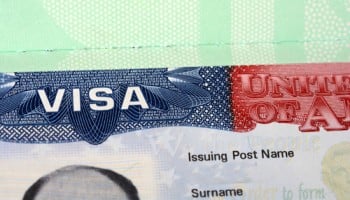ABA says decision of revoked war crimes prosecutor’s visa should be reversed; no US honeymoon for this lawyer

Image from Shutterstock.com.
Updated: The United States has revoked the visa of the chief prosecutor to the International Criminal Court because she has requested an investigation into war crimes in Afghanistan that could examine U.S. abuse in detention centers overseas.
The office of chief prosecutor Fatou Bensouda confirmed Friday that her visa had been revoked, report the Los Angeles Times, the BBC and the New York Times.
The office’s statement said Bensouda would continue to do her job “with utmost commitment and professionalism, without fear or favor.”
The U.S. Department of State also provided confirmation. “The United States will take the necessary steps to protect its sovereignty and to protect our people from unjust investigation and prosecution by the International Criminal Court,” the department said in a statement.
On Tuesday, ABA President Bob Carlson expressed concern about the U.S. government’s policy to restrict visas for certain officials of the International Criminal Court.
“The ABA urges the State Department to immediately reverse this policy decision and to refrain from taking actions against legal professionals based solely on their work on behalf of the ICC,” Carlson said in a statement.
Bensouda’s request for an investigation mostly focuses on alleged war crimes by the Taliban and Afghanistan government forces. But it also cited allegations that members of the CIA and U.S. military “committed acts of torture, cruel treatment, outrages upon personal dignity, rape and sexual violence against conflict-related detainees in Afghanistan and other locations, principally in the 2003-2004 period.”
The visa revocation is not expected to affect Bensouda’s travel to the United Nations, which is governed by a separate agreement, the New York Times reports.
National security adviser John Bolton has criticized the ICC as a “free-wheeling global organization” with unchecked power that threatens U.S. sovereignty. Bolton said the United States would take several steps if the court comes after the United States or its allies, including banning its judges and prosecutors from entering the United States.
The United States has not ratified the Rome Statute creating the court and is not a state party to the ICC.
Carlson said in his statement that, since 1978, the ABA has supported the creation of a permanent international criminal tribunal to bring to justice the perpetrators of genocide, war crimes and crimes against humanity. The ABA also participated in the negotiations that led to the creation of the ICC.
“In the United States, the independence and impartiality of our justice system is foundational to our democracy and commitment to the rule of law,” Carlson said in his statement. “Although the United States is not a member of the ICC, barring the travel of legal professionals because of their work on behalf of this international tribunal sends the wrong message about the United States’ commitment to those same principles in the pursuit of international justice and accountability.”
Bensouda is not the only overseas lawyer experiencing travel problems. Dutch terrorism defense lawyer Serge Weening was denied entry for a Miami honeymoon under a visa waiver program. Weening told Courthouse News Service he was denied entry after he was asked what he did for a living and whether he worked on any high-profile cases.
“Once I said the word terrorism, they ended the interview,” Weening said.
Other terrorism defense lawyers also have been denied visa waivers to the United States under the program known as the Electronic System for Travel Authorization, according to Courthouse News Service.
Updated April 9 at 12:05 p.m. to include the statement and comments from ABA President Bob Carlson.



